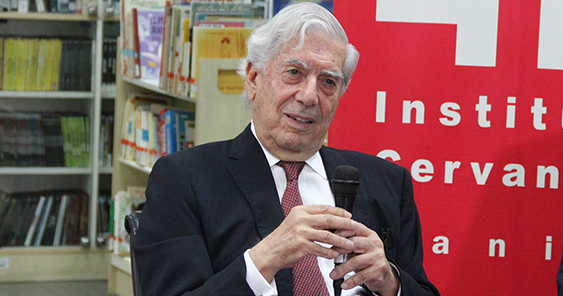“Literature is a form of permanent insurrection. Its mission is to arouse, to disturb, to alarm, to keep men in a constant state of dissatisfaction with themselves,” declared Mario Vargas Llosa, Peruvian novelist, playwright, journalist, former presidential candidate, and the 2010 Nobel Prize winner for Literature in a 1967 essay entitled ‘”Literature Is Fire.”
On his current return to Manila, only the second since attending the Poets, Essayists and Novelists (PEN) International in 1978, Llosa is igniting passion among literary fans once more.
At a press conference attended by adobo magazine and graced by Luis Calvo, ambassador of Spain to the Philippines and Carlos Madrid, Instituto Cervantes Manila director, at the Instituto Cervante Manila at the Ayala Tower on November 3, the 80-year old novelist revealed his insights to a new generation that has never known the world before digital.
“Why do you think literature exists? There is one reason for people writing and reading novels, short stories, dramas, poems. Probably the reason is we are looking for this parallel life, this other world which is the world of literature because we are not totally satisfied with the world as it is. We want something more. We want something different. I think this the major reason for literature to exist,” he extolls.
“Dictators are right in being suspicious of this kind of activity, because I think this activity develops in societies a critical spirit about the world as it is. Why do you think that all dictatorships have tried to control literature? They have established systems of censorship. They have given special laws to put limits to the fantasy world that literature creates because they mistrust very much this activity that is producing stories to replace the real world with the fantasy world of literature,” notes llosa, who once ran unsucessesfully for president of Peru in 1980 against Alberto Fujimori, curently in jail for human rights abuses.
On digital technology, the staunch liberal democrat and human rights advocate has much to say: “I think that the great audio visual revolution has been very very important in the way that it has enlarged extraordinarily information and communication. Because of the technological revolution it is very difficult and practically impossible to establish a very effective system of censorship in the world. You can try but there are ways in which you can avoid censorship. And this is fantastic for the world, for human rights, for freedom.”
“But on the other hand, the information we have at our disposal is so rich and so diverse and so confused that sometimes, its very difficult to understand what is going on because you have these very contradictory information,” he cautions.
“I am very worried about this war that is taking place between books and screens. My impression—I cannot justify it—is that if writers begin to write not for books but for screens, literature in particular and culture in general will become much more superficial, much more frivolous, much more banal. And this can have a very very negative effect not only in culture but in politics, human rights, in freedom,” the octogenarian opines.
The novelist and journalist, whose words graces the El Pais, the highest circulation newspaper in Spain, with his won weekly column, declares, “I am against anonymous. I have been victim of anonymous for many years and I hate this kind of literature that is not literature that is written with bad intentions, that is written usually to insult, to express a kind of rancor.”
“One of the negative effects of the technological revolution is that now your identity can be replaced artificially because of technology,” he warns, having been a victim himself of several badly written opinion pieces misattributed to him by anonymous authors.
Included in Mario Vargas Llosa’s current itinerary are events at the University of Santo Tomas (UST) where he will give a lecture and receive an honorary professorship on November 7 and at the De La Salle University (DLSU) where he will an honorary doctorate on November 8. His visit is made possible by Instituto Cervantes Manila and the Embassy of Spain in Manila. For details, visit http://manila.cervantes.es/en/








